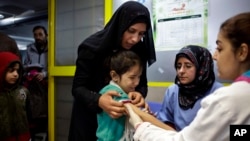Most vaccines require refrigeration, which can become a challenge in remote parts of Africa for non-governmental organizations providing aid.
One NGO in particular, Doctors Without Borders or Medecins Sans Frontieres, is urging drug manufacturers to investigate whether their vaccines can be shipped safely outside the so-called "cold chain" so the vaccines can become more widely available.
The cold chain requires that vaccines be kept at a specific, constant, cool temperature until they reach their final destination and is meant to prevent spoilage and ensure that the medicine remains effective.
The inability to keep some vaccines in the cold chain leads to vaccine shortages, causing 1-in-5 children under the age of 1 to miss the full schedule of vaccinations each year, said MSF.
Because most vaccines are produced by Western drug manufacturers, keeping the vaccines refrigerated is not a problem in developed countries, said Kate Elder, vaccine adviser to MSF.
“But when you get into countries like Chad and Democratic Republic of the Congo and South Sudan, where electricity is scarce and where roads are very poor and transportation very difficult, it becomes a huge challenge to keep these relatively fragile commodities cold all the way through to areas where kids need them," Elder said.
So MSF is urging drug manufacturers to re-evaluate vaccines to see whether they can be kept stable at temperatures up to 40 degrees Celsius.
Researchers determined that one vaccine used to prevent meningitis A in children in sub-Saharan Africa’s so-called meningitis belt remains effective without refrigeration for up to four days. MenAfriVac was relicensed by regulators in 2012.
MSF’s research arm in France, Epicentre, recently conducted a study of Serum India’s tetanus toxoid vaccine in Chad.
Epicentre found the vaccine retained its potency for up to one month at temperatures up to 40 degrees Celsius, providing the same level of protection as vaccine kept in a strict cold chain.
Elder said the results suggest that other immunization drugs probably do not need constant refrigeration to be safe and effective.
“A number of these vaccines might actually be more thermo-stable than what they are labeled for at refrigeration requirements of 2 to 8 degrees Celsius. So, what we are doing is pushing the manufacturers - the companies that make these products - to make sure that we can use them to that utmost thermo-stable potential," she said.
MSF is urging drug companies to take the lead in generating data to show that vaccines are heat-stable and can be safely transported outside the cold chain.
This would allow vaccines to be relicensed for use in remote parts of Africa and other regions where there is a lack of reliable refrigeration.
One NGO in particular, Doctors Without Borders or Medecins Sans Frontieres, is urging drug manufacturers to investigate whether their vaccines can be shipped safely outside the so-called "cold chain" so the vaccines can become more widely available.
The cold chain requires that vaccines be kept at a specific, constant, cool temperature until they reach their final destination and is meant to prevent spoilage and ensure that the medicine remains effective.
The inability to keep some vaccines in the cold chain leads to vaccine shortages, causing 1-in-5 children under the age of 1 to miss the full schedule of vaccinations each year, said MSF.
Because most vaccines are produced by Western drug manufacturers, keeping the vaccines refrigerated is not a problem in developed countries, said Kate Elder, vaccine adviser to MSF.
“But when you get into countries like Chad and Democratic Republic of the Congo and South Sudan, where electricity is scarce and where roads are very poor and transportation very difficult, it becomes a huge challenge to keep these relatively fragile commodities cold all the way through to areas where kids need them," Elder said.
So MSF is urging drug manufacturers to re-evaluate vaccines to see whether they can be kept stable at temperatures up to 40 degrees Celsius.
Researchers determined that one vaccine used to prevent meningitis A in children in sub-Saharan Africa’s so-called meningitis belt remains effective without refrigeration for up to four days. MenAfriVac was relicensed by regulators in 2012.
MSF’s research arm in France, Epicentre, recently conducted a study of Serum India’s tetanus toxoid vaccine in Chad.
Epicentre found the vaccine retained its potency for up to one month at temperatures up to 40 degrees Celsius, providing the same level of protection as vaccine kept in a strict cold chain.
Elder said the results suggest that other immunization drugs probably do not need constant refrigeration to be safe and effective.
“A number of these vaccines might actually be more thermo-stable than what they are labeled for at refrigeration requirements of 2 to 8 degrees Celsius. So, what we are doing is pushing the manufacturers - the companies that make these products - to make sure that we can use them to that utmost thermo-stable potential," she said.
MSF is urging drug companies to take the lead in generating data to show that vaccines are heat-stable and can be safely transported outside the cold chain.
This would allow vaccines to be relicensed for use in remote parts of Africa and other regions where there is a lack of reliable refrigeration.








